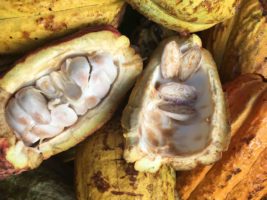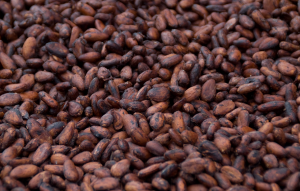Seven chocolate manufacturers named in Ivory Coast cocoa sector child labour lawsuit

A landmark court case has begun in the US against seven major chocolate companies on behalf of eight Malian young men who claim to have been victims of child trafficking, and forced to work on cocoa plantations in Ivory Coast, writes Neill Barston.
The federal class action, filed by IRAdvocates, is thought to be the first sector-wide litigation of its kind, and names manufacturers including Hershey, Mars, Cargill, Mars, Mondelēz, Nestle, Barry Callebaut and Olam, that have refuted the charges, and strongly condemned child labour practices, citing their combined efforts in tackling the wider issue as it continues to impact on the industry.
According to the human rights organisation behind the legal case, the businesses – which have rejected the claims made collectively against them – were being held jointly liable as being part of the cocoa supply chain.
IRAdvoctes cited the 2001 Harkin Engel Protocol, that centred on confectionery businesses originally signing up to eradicating child labour by 2005, as evidence that its renewed extension until 2025, provided evidence that the situation was in fact becoming worse in West Africa.

The legal organisation also cited studies from NORC at the University of Chicago last year, that found that since 2015, there had been a 14% increase in child labour in West Africa since 2014, with 1.48 million children reportedly engaged in hazardous work during this period.
The case, which comes amid the UN’s designated year of eradicating child labour, has reportedly been filed based primarily on the Trafficking Victims Protection Reauthorisation Act (“TVPRA”), which allows victims of trafficking and forced labour to sue companies that participate in a “venture” and benefit from the trafficking or forced labour.
Strong response
In response to the collective charge against the major industry manufacturers, the companies stressed their zero-tolerance of child trafficking within supply chains, as well as condemning wider child and forced labour issues that have remained issues within Ghana and Ivory Coast.
A spokesperson from Hershey said: “We understand and agree with the concerns about the heartbreaking instances of child and forced labor. Hershey does not tolerate child or forced labour in our supply chain. These human rights violations have no place in the global cocoa industry, and we are committed to ending it. Effectively eliminating human rights violations and addressing the underlying issue of poverty that is the root cause of these labor violations requires significant investment and intervention on the ground in West Africa, not in the courts.
“We have worked hard over the past several years to implement meaningful programs and work with our cocoa suppliers and West African governments to combat these issues and use our influence to make a positive impact. Our suppliers have worked to quickly scale the Child Labor Mitigation and Remediation Systems – the best available system for identifying and remediating child labour – across the cocoa supply chain in Ivory Coast and Ghana. In 2020, the scope of the CLMRS programs more than doubled, which now cover nearly 50% of our cocoa sourcing in Ivory Coast and Ghana. The CLMRS programs our suppliers have rolled out across our cocoa supply chain in West Africa have found no instances of forced labor to date. Over the next few years, we expect these programs to cover 100% of our sourcing in Cote d’Ivoire and Ghana.”
He added that the cocoa industry, the West African governments and NGOs were working together to quickly end the Human Rights violations of child labour in the region, and added that while forced labor represents 0.17% of child labour in West Africa according to recent data, the company remains committed to investing in programs to end these Human Rights violations. Any form of child labor has no place in our supply chain.
Speaking to Confectionery Production, Swiss-headquartered Barry Callebaut issued a similarly condemnatory response to the court case and the issues it raises.
The company said: “We strongly condemn forced labor, slavery and all practices that exploit both adults and children or expose them to harmful or hazardous conditions. Child labour, which according to the International Labor Organization is widespread in African agriculture, occurs largely on family farms and is defined as children doing work when too young or work that endangers them.
“The lawsuit brought forward by International Rights Advocates concerns the rare practice of trafficking children to work on farms, which the Ivorian and Ghanaian governments, together with industry, are actively combating. Barry Callebaut has committed to eradicate child labor from its supply chain by 2025.
“Every year we publish our progress against this target in our Forever Chocolate Plan. For a detailed description of Barry Callebaut’s approach and efforts toward safeguarding human rights and ensuring that slavery and human trafficking are not taking place in any part of our business and our supply chain, please see our annually updated human rights statement.
“We require our suppliers to follow our supplier code, which clearly states our expectations regarding product safety and quality, sustainability and business ethics. On child labor the code reads, in part, “the supplier does not recruit or engage the use of child labor and respects and realises the principles of ILO Convention No. 138, on the minimum age for admission to employment and work, and ILO Convention No. 182, on the worst forms of child labour.”
The company added that child labour in cocoa growing regions remains a complex and multifaceted issue throughout the world, despite major efforts by governments, cocoa and chocolate companies, cocoa-growing communities, and development partners.

Consequently, it said that the challenges facing children in cocoa-growing communities are rooted in interrelated, structural issues such as poverty and lack of access to essential services, including quality education, health care, drinking water and sanitation facilities. Industry-led commitments are yielding advances in eliminating and mitigating the worst forms of child labor in the cocoa supply chain, however a collaborative framework based on commitments from public and private stakeholders, combined with a strong legal framework in both cocoa consuming and producing countries, are essential to sustain lasting improvements to this complex problem.
Specifically in response to this, the company noted that it is a founding member of the Cocoa and Forests Initiative (CFI), a multi-stakeholder initiative, including the Ivorian and Ghanaian government, dedicated to end cocoa farming in protected forest areas in Ghana and Ivory Coast.
A key element of the CFI includes the introduction through legislation of 100% traceability of cocoa, creating transparency in the supply chain and its practices.
In its response, Nestlé cited its own strong stance against child labour across its operations, joining the other businesses in asserting that combined action is required to tackle its challenging elements.
The company said: “Child labour is unacceptable and goes against everything we stand for. Nestlé has explicit policies against it and is unwavering in our dedication to ending it. We remain committed to combatting child labor within the cocoa supply chain and addressing its root causes as part of the Nestlé Cocoa Plan and through collaborative efforts.
“This lawsuit does not advance the shared goal of ending child labor in the cocoa industry. Child labour is a complex, global problem. Tackling this issue is a shared responsibility. All stakeholders – including governments, NGOs, the communities and the broader cocoa industry – need to continue to address its root causes to have an impact.
“Increasing access to education, helping to modernise farming methods, and improving livelihoods are crucial to combatting child labor in cocoa production. We are committed to prevent and address child labor wherever it occurs in our supply chain. Alongside the International Cocoa Initiative, Nestlé has implemented a Child Labor Monitoring and Remediation System, which involves identifying children at risk, engaging directly with households and communities, and providing targeted remediation measures to address any issues uncovered and ultimately help to prevent future activity.”
Zero tolerance stance
As for the other named companies in the case, Confectionery Production has recently interviewed Cargill which stressed its zero tolerance on child labour within its supply chains.
The company is soon to release its latest decade of impact report, examining sustainability progress regarding its operations in the sector, and it has worked closely with humanitarian organisation CARE in assessing a broad range of support mechanisms for cocoa growing territories. This has included agricultural programmes, education initiatives, as well as wider community prevention schemes such as helping combat linked issues of poverty through empowering women to be more financially literate.
According to the last joint report between Cargill and CARE (covering the period of 2008-2018, they had reached more than 418,000 people directly, and supported 1,786,000 indirectly as a result of its joint initiatives in support of the sector’s future development.
For its part, Mars has just released its latest report on the company’s progress in deliver impact on human rights within the cocoa chain, which is part of the company’s wider $1 billion investment programme into raising its overall sustainability standards.
A spokesperson for the company said: “We do not comment on pending litigation, but Mars has long held that our business must uphold fundamental human rights for all and that child or forced labor has no place in the cocoa supply chain. Our efforts to address the root causes of this complex issue are grounded in actions taken with farmers, our industry, government leaders and civil society to support the long-term prospects of cocoa farming households and communities.
Meanwhile, Olam also moved to reaffirm its stance on forced labour and child labour, with the company having been a prominent member of the Cocoa and Forests Initiative that seeks to provide a broad base of support to Ghana and Ivory Coast, centred on key commitments for preventing deforestation and broader sector concerns over children’s employment in the industry.
“Olam has a zero-tolerance policy for forced or slave labour in our supply chain. If we were to identify any instances, we would immediately take action which includes notifying the appropriate authorities,” said a spokesperson for the company.
Confectionery Production also approached Mondelez international for comment, and the business explained that it did not have a policy on commenting surrounding legal proceedings.
As previously reported, the company has a number of measures aimed at supporting cocoa growing communities, chiefly its Cocoa Life scheme, unveiled in 2012, as a $400 million, 10-year initiative to support a total of 200,000 farmers across six countries.
The company issued a general statement on its stance against forced labour and child labour. It read”: “Forced labour and child labor have no place in the cocoa supply chain. Our #CocoaLife program is working to tackle child labour in cocoa by addressing its root causes, including: relative poverty of farmers, lack of infrastructure such as running water and roads, and poor access to schools and healthcare.
“We have been working relentlessly to help resolve the issue of child labour for over a decade. Our approach focuses on prevention, monitoring and remediation, focusing on education as a critical enabler. Identified cases of child labour are remediated with the support of our partner NGOs and the appropriate local and regional authorities.”



